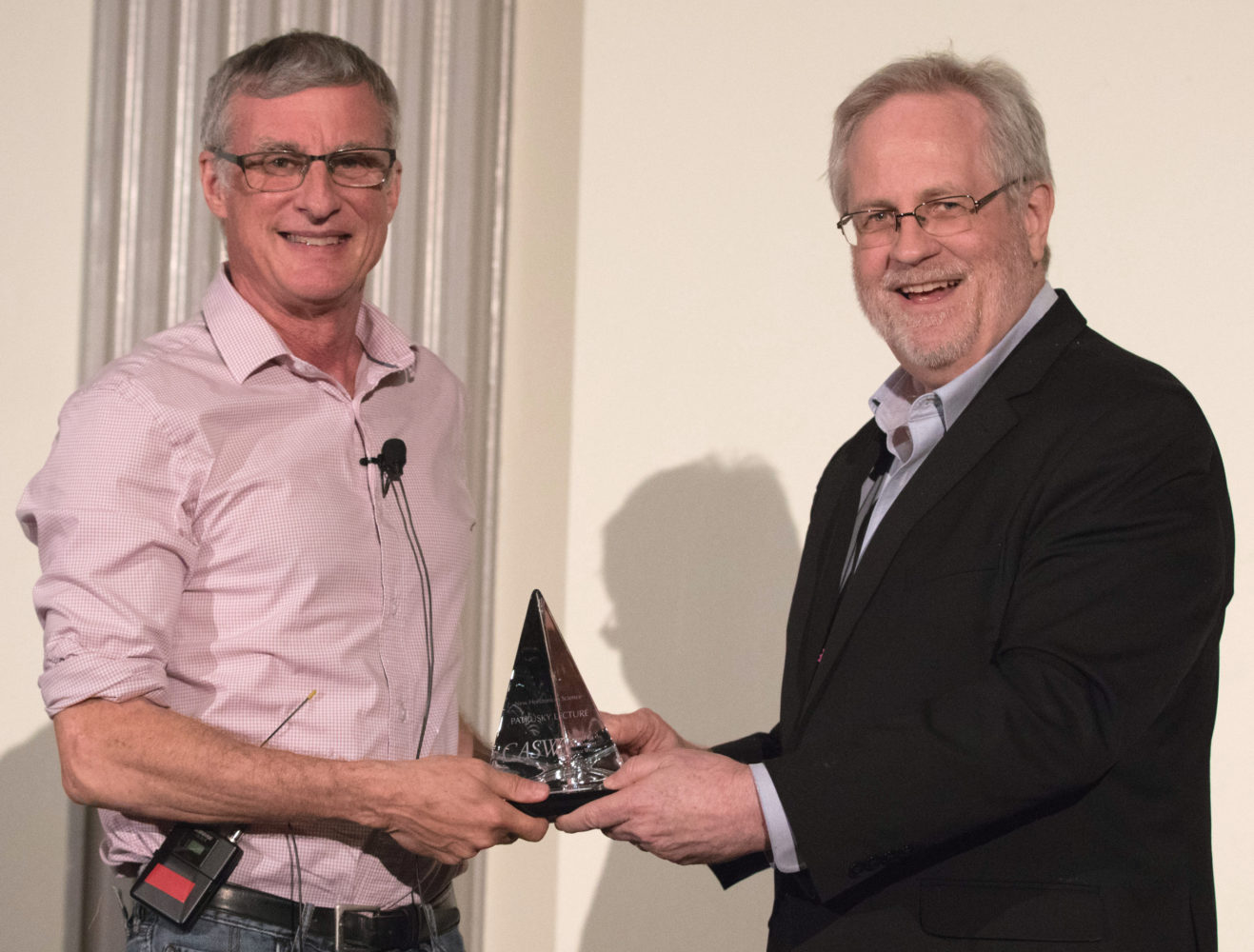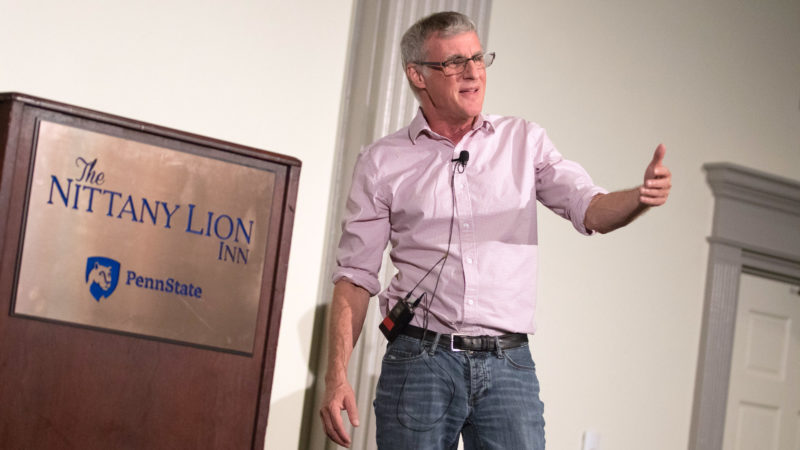
Steven Squyres presents seventh Patrusky Lecture at ScienceWriters2019
CASW president Alan Boyle (right) presents a commemorative sculpture to 2019 Patrusky Lecturer Steve Squyres.
Planetary scientist Steven W. Squyres, lead scientist for the long-lived Mars rovers Spirit and Opportunity, was selected by the Council for the Advancement of Science Writing to present the seventh Patrusky Lecture on October 27, 2019, as part of CASW’s New Horizons in Science program at the ScienceWriters2019 conference. A full video recording of the lecture may be found on the Patrusky Lectures video page.
Squyres is a seasoned explorer of our solar system, having participated in NASA’s Voyager and Magellan missions before becoming principal investigator for the Mars Exploration Rover (MER) mission. That mission became one of NASA’s longest and most fruitful for science.
When the twin rovers landed on Mars in 2004, they were expected to explore for 90 Martian days; instead, they roamed the Red Planet for years, providing a bonanza of information about Mars. Spirit lasted until 2010, while Opportunity stayed on the job until it lost contact with Earth a year ago during a Martian dust storm.
“From breaking new ground in planetary science to assessing the course of human spaceflight, Steve has played leading roles on a wide swath of the final frontier,” said CASW President Alan Boyle, aerospace and science editor at GeekWire (shown below right awarding a commemorative sculpture to Squyres). “He’s the perfect Patrusky Lecturer for a year that marks the 50th anniversary of the Apollo 11 moon landing as well as a rising tide for America’s space effort.”
About Steven Squyres
Squyres is the James A. Weeks Professor of physical sciences at Cornell University, where he received his Ph.D. in 1981 before leaving for five years of postdoctoral research at the NASA Ames Research Center. He has participated in a number of planetary spaceflight missions, starting with his work analyzing imaging data from Voyager’s encounters with Jupiter and Saturn as a graduate student, and is especially known for his work on the history and distribution of water on Mars. His research focuses on the robotic exploration of planetary surfaces; the geophysics and tectonics of icy satellites, such as Jupiter’s moon Europa with its possible liquid water ocean; the tectonics of Venus; and planetary gamma-ray and X-ray spectroscopy.
Squyres was a member of the imaging team for the Cassini mission to Saturn and participated in the Near Earth Asteroid Rendezvous–Shoemaker mission. The Mars Exploration Rovers are hardly his only connections to the Red Planet. He has served on science teams for Mars Express, Mars Reconnaissance Orbiter, Mars Odyssey, Mars 96, Mars Polar Lander and Mars Observer.
He also served two stints as an aquanaut in the Aquarius underwater laboratory, in 2011 and 2012, as part of a space mission simulation program known as NASA Extreme Environment Mission Operations, or NEEMO.

Squyres has received numerous honors, including the 2004 Carl Sagan Memorial Award from the American Astronautical Society, the 2009 Carl Sagan Medal for Excellence in Communication in Planetary Science and Harold C. Urey Prize in Planetary Science from the American Astronomical Society, the Benjamin Franklin Medal in Earth and Environmental Science from the Franklin Institute, and the Mines Medal from the South Dakota School of Mines & Technology. He is the author of the 2005 book Roving Mars: Spirit, Opportunity, and the Exploration of the Red Planet
Squyres and his team finally shut down the MER mission after 15 years, in February of this year. “If you had told me around the time that we landed that Spirit and Opportunity were going to each accomplish one-quarter or even one-tenth of what they ultimately did, I would have been thrilled,” Squyres told a Cornell writer. He credited NASA’s Jet Propulsion Laboratory with building such durable vehicles “that Mars just kept giving us more stuff. The payoff has been immensely greater than anything ever imagined in our wildest dreams.”
Recently Squyres served as chair of the NASA Space Science Advisory Committee and as a member of the NASA Advisory Council.
The Patrusky Lectures
The Patrusky Lectures were launched by CASW in 2013 to honor Ben Patrusky, who served as the council’s executive director for 25 years and as director of the New Horizons in Science program for 30 years. Previous Patrusky Lecturers include chemist George M. Whitesides of Harvard University; paleontologist Donald Johanson of Arizona State University’s Institute of Human Origins; Yale microbiologist Jo Handelsman, then associate director for science at the White House Office of Science and Technology Policy; Nobel-winning particle physicist Steven Weinberg of the University of Texas at Austin; Susan Desmond-Hellmann, CEO of the Bill & Melinda Gates Foundation; and geneticist Shirley Tilghman, former president of Princeton University.